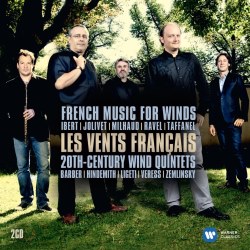|

|
Les Vents Français - Music for Wind Quintet
Jacques IBERT (1890-1962)
Trois Pièces brèves (1930) [6:49]
Maurice RAVEL (1875-1937)
Le Tombeau de Couperin (1914/19) (transc. Mason Jones) [14:48]
André JOLIVET (1905-1974)
Sonatine for oboe and bassoon (1963) [8:08]
Darius MILHAUD (1892-1974)
Suite: La Cheminée du Roi René (The Chimney of King René), Op. 205 (1939) [13:11]
Paul TAFFANEL (1844-1908)
Wind Quintet (1876) [23:41]
György LIGETI (1923-2006)
Six
Bagatelles for wind quintet (arr. Ligeti from Musica ricercata) (1953) [12:21]
Alexander von ZEMLINSKY (1871-1942)
Humoreske: Rondo (1939) [4:18]
Samuel BARBER (1910-1981)
Summer Music, Op. 31 (1955/56) [11:38]
Sándor VERESS (1907-1992)
Sonatina per oboe, clarinet and bassoon (1933) [8:59]
Paul HINDEMITH (1895-1963)
Kleine Kammermusik (Little Chamber Music) for wind quintet, Op. 24/2 (1922) [13:21]
Les Vents Français (Emmanuel Pahud (flute); Paul Meyer (clarinet); François Leleux (oboe); Gilbert Audin (bassoon); Radovan Vlatkovic (horn))
rec. 27-31 August 2011, Bavaria Musikstudios, Munich, Germany
WARNER CLASSICS 2564 634845 [67:01 + 51:00]
This double CD features renowned flautist Emmanuel Pahud collaborating with four of the finest wind players on the international stage. They are known collectively known as Les Vents Français.
Many music-lovers will know Geneva-born Pahud primarily as a principal of the Berlin Philharmonic Orchestra who joined them in 1992. With regard to Pahud’s careers as an orchestral player and chamber musician he says, “it’s like having two musical lives, but one musical world.”
Disc one, entitled French Wind Quintets comprises five works from the pens of French composers Jacques Ibert, Maurice Ravel, André Jolivet, Darius Milhaud and Paul Taffanel. Probably the finest original work for wind quintet here is the Milhaud Suite: La Cheminée du Roi René from 1939. It was composed for a film entitled Cavalcade of Love. Especially memorable is the concluding ‘Madrigal - Nocturne’ used as the signature tune to the BBC Radio 3 ‘Through the Night’ broadcasts. Ravel’s Le Tombeau de Couperin is primarily work for solo piano in the manner of a baroque suite. Its beautifully crafted movements are dedicated to friends who died in the First World War. It has become enduring popular in Ravel’s own glorious orchestration. Mason Jones (1919-2009), long principal horn with the Phiadelphia Orchestra, prepared this splendid transcription for wind quintet. Both Ibert’s Trois Pièces brèves, highly melodic and with a lovely summery feel and Taffanel’s lyrically appealing Wind Quintet (1876), are fine works that deserve to be much better known. The lesser known gem here by Jolivet. It is not a quintet but an engaging three movement Sonatine for oboe and bassoon. This contains a skittish Ouverture and a jaunty, dance-like closing Ostinato flanking a more serious yet attractive central Récitatif. There is plenty of room to have accommodated another work such as the Françaix Wind Quintet No. 1 (1948) or Auric’s Trio for oboe, clarinet and bassoon (1938).
The second disc, entitled 20th Century Wind Quintets doesn’t restrict itself geographically. It offers high quality works by five composers: György Ligeti, Alexander von Zemlinsky, Samuel Barber, Sándor Veress and Paul Hindemith. The best known is probably Barber’s Summer Music (1955/56), an optimistic single movement, full of appealing moods and lasting just over eleven and a half minutes. Also highly popular is Hindemith’s delightfully wrought Kleine Kammermusik (Little Chamber Music) cast in five contrasting movements, It forms part of a set of eight Kammermusik written in 1922/27 and all worth investigating. Ligeti arranged his 6 Bagatelles for wind quintet in 1953 from a set of eleven piano pieces called Musica ricercata. Ligeti’s works are often intensely challenging and although these Bagatelles follow strict harmonic structures there is nothing too difficult to worry about as these are quite delightful. It’s good to see that wind ensembles are now regarding these Ligeti works as core repertoire. Listening to Capriccioso, the final Bagatelle of the set, it’s hard to believe that this fascinating piece was once banned in Hungary for its dissonance and chromaticism. Swiss-born Sándor Veress is undoubtedly the least known of the composers on disc two. Veress is represented here not by a quintet but by his three movement Sonatina for oboe, clarinet and bassoon. The trio’s jaunty opening Allegro giocoso and good natured Finale enclose a central movement slightly more serious in nature but still likable. Zemlinsky’s easy-going Humoreske: Rondo might only be a single movement lasting just over four minutes yet it is highly appealing. Cleverly evocative of nature sounds it is redolent of Mahler. At only fifty-one minutes this second disc is even shorter measure and there are some fascinating works that might have been included. Malcolm Arnold’s Wind Quintet (1943), the Divertimento for flute, oboe and clarinet (c. 1952) and the 3 Shanties for wind quintet (1943) would have made excellent choices.
Throughout these two discs Les Vents Français perform with the accomplishment one expects from such an eminent group. No single player stands out such is the unity of the playing. It’s hard to fault these fresh and engaging interpretations that have the spontaneous feel of a live concert. The engineers have provided good sound clarity together with excellent instrumental balance.
This set has already received acclaim following its release in Japan winning a Record Academy Award for Chamber Music.
Playing duration aside, chamber music enthusiasts and admirers of wind ensembles in particular have no reason to hesitate with this excellent double CD set.
Michael Cookson
 |
 |
|











